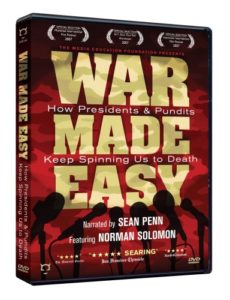While a bit outdated, this documentary addresses the practice of spinning acts of war to be more palatable for citizens of the United States in the last half century.
Every United States president has said he wants peace and that war is only used as a final option. That couldn’t be further from the truth.
Narrated by Sean Penn, War Made Easy features media critic Normal Solomon who draws parallels between the Vietnam War and the recent war in Iraq. In both cases, bogus reasons for getting into the wars were employed.
In Vietnam, it was the 1964 Gulf of Tonkin “attack” on the destroyer the USS Maddox by North Vietnamese ships that opened the floodgates for President Lyndon B. Johnson to sharply increase U.S. involvement in the war.
In the recent war in Iraq, it was Saddam Hussein’s alleged possession of weapons of mass destruction that “forced” America’s hand to invade Iraq.
What Solomon shows in clip after clip is how the American media picks up on buzzwords used by members of the administration to narrow the sphere of legitimate controversy in the press.
By allowing themselves to be the mouthpiece of the government, the mainstream media has lost credibility.
Media outlets must address the timeless quandary: Do they report the news as objectively as possible at the risk of losing access to government figures or do they fall in lock step with what the administration deems newsworthy?
The film also shows how the presidents – particularly George H. W. Bush – try to remove what is referred to as the “Vietnam Syndrome,” the reluctance of the population to go to war. In some circles the media is blamed for the U.S. failure in Vietnam in part because it showed so much pain and suffering of the troops.
By the time the 1991 Gulf War came around, the administration was ready for the media. By limiting access to the troops and providing journalists with press pool coverage of the war, the public pretty much only saw what the government wanted it to see.
Then, in the recent war in Iraq, as many as 500 journalists were “embedded” with the troops on the ground. This was clever on the part of the administration.
 While apparently being provided with deep access, the news people bonded with the troops and felt themselves part of the war effort. Once they identified so strongly with the troops, all objectivity went out the window.
While apparently being provided with deep access, the news people bonded with the troops and felt themselves part of the war effort. Once they identified so strongly with the troops, all objectivity went out the window.
Also, War Made Easy shows how anti-war talk show host Phil Donahue was fired weeks before the invasion of Iraq.
And, a memo from the CNN front office made it clear that it wanted those covering the Iraq war to repeatedly remind viewers the war was caused by the events of September 11, 2001.
The film also shows footage from the early 1960s of Oregon Sen. Wayne Morse arguing that the citizenry of the United States should have a say in formulating foreign policy and that it should not be the bailiwick of the president alone.
It appears George Orwell was right about how the use of language informs our understanding of the world.
For example, the United States War Department changed its name to the Department of Defense in 1949.
And, the call to “Support Our Troops” has become synonymous with “Support the War.”
Again, while the film is five years old, it provides the viewer with an insight into how information has been and is being spun to provide U.S. presidents carte blanche when dealing with the rest of the world.
War Made Easy is available to rent.
Murphy can be reached at: [email protected]